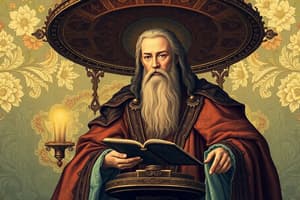Podcast
Questions and Answers
Who is known for challenging Aristotelian principles through telescopic observations?
Who is known for challenging Aristotelian principles through telescopic observations?
- Copernicus
- Isaac Newton
- Johannes Kepler
- Galileo Galilei (correct)
Which scientist's support for the heliocentric theory led to his arrest and trial by the Inquisition?
Which scientist's support for the heliocentric theory led to his arrest and trial by the Inquisition?
- Galileo Galilei (correct)
- Isaac Newton
- Nicolaus Copernicus
- Johannes Kepler
Who laid the foundation for modern science through significant discoveries in astronomy and physics?
Who laid the foundation for modern science through significant discoveries in astronomy and physics?
- Galileo Galilei (correct)
- Johannes Kepler
- Isaac Newton
- Nicolaus Copernicus
Which scientist is known for formulating the laws of universal gravitation and developing calculus?
Which scientist is known for formulating the laws of universal gravitation and developing calculus?
Who introduced calculus to mathematical modeling in his work 'Mathematical Principles of Natural Philosophy'?
Who introduced calculus to mathematical modeling in his work 'Mathematical Principles of Natural Philosophy'?
Which scientist's findings were later vindicated despite facing arrest and trial for supporting heliocentrism?
Which scientist's findings were later vindicated despite facing arrest and trial for supporting heliocentrism?
Who is credited with developing Cartesian coordinates?
Who is credited with developing Cartesian coordinates?
Which philosopher advocated for skepticism, rationalism, and dualism between mind and body?
Which philosopher advocated for skepticism, rationalism, and dualism between mind and body?
Who emphasized empiricism over speculation and systematic observation in scientific methodology?
Who emphasized empiricism over speculation and systematic observation in scientific methodology?
Which thinker's work 'Novum Organum' proposed a framework for inductive reasoning?
Which thinker's work 'Novum Organum' proposed a framework for inductive reasoning?
Which philosopher introduced the concept of analytic geometry?
Which philosopher introduced the concept of analytic geometry?
Whose emphasis on empirical evidence and critical thinking paved the way for advancements in technology and medicine?
Whose emphasis on empirical evidence and critical thinking paved the way for advancements in technology and medicine?
Flashcards are hidden until you start studying
Study Notes
Introduction
The history of human thought has been marked by numerous periods of intellectual transformation, each characterized by the emergence of influential thinkers who introduced groundbreaking concepts and theories. One such period was the scientific revolution of the 16th century, which ushered in a new era of scientific inquiry and discovery. This article provides a brief overview of some key figures during this time, their contributions, and how these developments influenced the growth of new ideas.
Galileo Galilei (1564–1642)
Galileo Galilei's pioneering work in astronomy and physics laid the foundation for modern science. He challenged Aristotelian principles through his observations with telescopes and made significant discoveries regarding heliocentrism, celestial mechanics, and other aspects of physical laws. His support for Copernicus' theory of Earth revolving around the sun led to his arrest and trial by the Inquisition; however, his findings were later vindicated.
Isaac Newton (1642–1727)
Sir Isaac Newton is renowned for developing the foundations of classical physics and mathematics. His three-volume work "Mathematical Principles of Natural Philosophy," known as "Principia Mathematica," introduced calculus to mathematical modeling, enabling him to derive Kepler's laws from celestial observations, formulate universal gravitation, and explain various natural phenomena.
René Descartes (1596–1650)
René Descartes contributed significantly to philosophy and mathematics. He developed Cartesian coordinates, which transformed geometry into algebra, and introduced the concept of analytic geometry. In philosophy, he advocated for skepticism, rationalism, and dualism between mind and body, influencing subsequent philosophers like Spinoza and Leibniz.
Francis Bacon (1561–1626)
Francis Bacon played a crucial role in shaping the scientific methodology used today. He emphasized empiricism over speculation, advocating systematic observation, experimentation, and recording results accurately. His seminal work "Novum Organum" proposed a framework for inductive reasoning and served as an early blueprint for the scientific revolution.
The collective works of these pioneers established the basis for scientific progress in subsequent centuries. Their emphasis on empirical evidence and critical thinking paved the way for more precise understanding of nature and its laws, ultimately leading to advancements in technology, medicine, and everyday life.
Studying That Suits You
Use AI to generate personalized quizzes and flashcards to suit your learning preferences.




